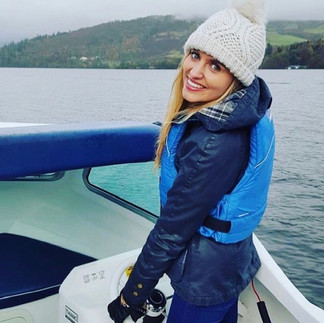By Tilly Rose
My diagnosis continued...
5. Did you meet any stand-out medics along the way?
Lots of you following me will have heard of Maverick! He was the absolute hero of my 3 month admission. When all the other medics gave up, he was determined to try to help me, staying after his shift to research my case and returning to my ward after hours to see me, when he was no longer managing my case. He tried so hard to help me but was restricted by a system which was not designed for patients without a diagnosis. For instance, he wanted to move me off the chaos of AMU onto his Infectious Disease ward, where he could manage me but the system said NO, I didn't have an infectious disease, so instead I was made to live in the traumatic setting of AMU for over 6 weeks, where I had a different consultant taking over my case each week, with no continuity of care. This made no sense!
6. Did you have any negative interactions with medics along the way?
Sadly, so many. I found that medics started off pretty lovely but when they couldn't solve my case, their attitudes changed. Day one they were sympathetic and felt sorry for me but when they couldn't diagnose me, it started to feel like they lost interest or, in some cases, blamed me for my illness. I will never forget one of the consultants who came to my bedside towards the end of my 3 month admission and started talking about 'perceived inability to walk' and my 'perceived paralysis'. To have someone use this sort of language, after being so incredibly poorly (a lactate level of 11!), I found to be hugely upsetting.
Now I have my diagnosis (which includes blood leaking into my spine causing paralysis) I plan to return to this doctor and share my story. I am heartbroken for myself lying in that bed, hearing those words, after I had fought so hard and had been through the most hellish experience. Who would choose to live on an open ward, in a blue box, with no windows, with people screaming and dying around them?
7. What was the test that finally diagnosed you?
During my 3 month admission, I asked my Instagram followers for diagnosis and test ideas. A few came back suggesting a condition called MALS. Over the last year, my mum worked her way through the list of suggestions and whilst MALS didn't fit exactly, it was part of a group of conditions called Vascular Compression Syndromes. The more my mum researched, the more she realised that you could have these in all different parts of your body. In her research, a professor in Germany kept appearing who had a 4D Doppler Scanner, specialist at detecting these compressions. When the UK medics had given up searching for a diagnosis for me, we decided we had nothing to lose and everything to gain by heading to Germany. At the end of last year I GOT A DIAGNOSIS!
I was diagnosed with multiple vascular compressions, causing my right kidney to drop 10cm down my back. The pressure from the compressions is also causing blood to leak into my spine, explaining my neurological symptoms.
This diagnosis finally explained ALL of my symptoms! It was the best feeling in the world!
8. What would your tips be for anyone else who thinks they could have a similar diagnosis to you?
Sadly, many patients take years to get diagnosed, as vascular compressions are still not very well understood in many countries around the world.
1. Be aware of the correlation between vascular compression syndromes and Ehlers Danlos/hypermobility. I have learnt that being bendy on the outside can make you bendy on the inside too, making patients more predisposed to these compressions.
2. Do your own research or ask someone to help you research.
3. If you think you fit the symptoms, go to your GP or consultant, armed with every bit of evidence you have to support your case. You could ask if you can be referred to a vascular expert.
4. Be aware that these compressions aren't always picked up on standard MRI or CT scans. Mine was missed on this in the UK.
5. You could ask for your scans to be sent to a vascular surgeon who is more expert in interpreting the scans or some patients choose to go abroad, like I did (I realise I was very lucky to be able to find a way to do this!)
For more info on my own journey and how my diagnosis/treatment unfolds, you can follow my Instagram @thattillyrose
Get involved in our patient community by following @thatpatientcollective







Comments